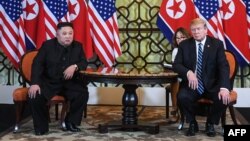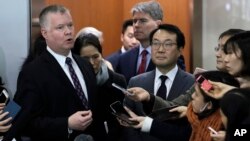South Korean President Moon Jae-in says he’s ready to step in and be the mediator between the United States and North Korea after the two nations failed to reach an agreement in Hanoi last week. However, it remains to be seen what the South Korean leader can do to move U.S. President Donald Trump and North Korean leader Kim Jong Un closer to a deal both sides can be happy with.
Handong Global University professor of international studies, Kim Joon-hyung tells VOA that there was a general hope that a “big deal” could be achieved between Trump and Kim without going through some “middles stages,” referring to what has been commonly called a “top-down” approach to negotiations.
However, without an agreement reached in Hanoi, Kim said, “The role of President Moon so far has not been active, he’s only been liaising with two sides to facilitate meetings when there’s been a deadlock, but now it is necessary to take an active role.”
But, Shin Beom-chul, a senior fellow at Asan Institute for Policy Studies, said Moon’s action could come at a cost.
“If Moon keeps suggesting the sanction lifting prior to the denuclearization, then it will worsen the alliance,” Shin said, referring to calls by Moon to eliminate or provide exemptions to sanctions on North Korea to allow proposed inter-Korean projects to move forward.
Moon’s mission
Tuesday President Moon ordered his Cabinet to pursue all avenues to facilitate a resumption of discussions between Washington and Pyongyang.
“We look forward to continuing the dialogue between the two countries, and I expect that the two leaders will meet again in the near future and achieve the settlement this time,” Moon said earlier this week while presiding over a National Security Council meeting.
Moon called the failure to reach an agreement between the United States and North Korea in Hanoi “regrettable,” but spoke optimistically that “meaningful progress” had been made.
In a statement to reporters, Moon said, “The Korean Government will do all it can to ensure that the United States and North Korea can maintain momentum for dialogue while continuing their close communication and cooperation.”
After the Hanoi summit resulted in no agreement being signed between President Trump and Kim, Moon said South Korea’s role has become important and directed ministers to take action.
At a National Security Council meeting Tuesday, Moon asked officials to “confirm the differences in the positions of the two sides” and “look for ways to narrow the gap.”
“I believe that the North American dialogue will eventually be settled, and it’s very undesirable to have a vacuum and deadlocked stage for a long time, so please work hard together for the resumption of the North American dialogue,” Moon said.
Back to the diplomats
Part of that endeavor includes Lee Do-hoon, South Korea’s top nuclear negotiator, visiting Washington this week to meet with Stephen Biegun, the U.S. Special Representative for North Korea, as well as a trilateral meeting with his Japanese counterpart, Kenji Kanasugi.
“Before the [Hanoi] summit, the pros of the top-down approach worked out; however, now it shows its cons,” Kim said.
Shin, of the Asian Institute for Policy Studies, was more critical, saying the “top-down” approach was no longer valid, saying it “worsened the situation.”
Kim also stressed the importance of establishing working-level groups in order for denuclearization talks to move forward.
U.S. Secretary of State Mike Pompeo said he hopes to be able to send a delegation to North Korea soon to conduct follow-up talks with officials in Pyongyang, but told those at an event in Iowa Monday there had been “no commitment yet.”
Shin calls the current stalemate with North Korea a “difficult dilemma.”
“North Korea controls the outcome, since they are the ones who must decide to change,” Shin said.
He said Washington will continue to press Pyongyang for complete denuclearization before the lifting of sanctions.
Shin said that makes it important for South Korea to “liaise with the North and get positive results,” which would enable Seoul to persuade Washington to take action.
As a result, Shin said, “President Moon is risking all political capital on this issue.”
Speaking Tuesday at the commissioning ceremony at the Korean Naval Academy, Moon said, “Should we consistently pursue peace with firm determination, denuclearization of the Korean Peninsula and permanent peace will definitely come.”
Kim offered some advice to Washington, “The United States should not treat North Korea as a defeated nation or devilize them, because North Korea cannot accept total surrender.”
Lee Ju-hyun contributed to this report.









